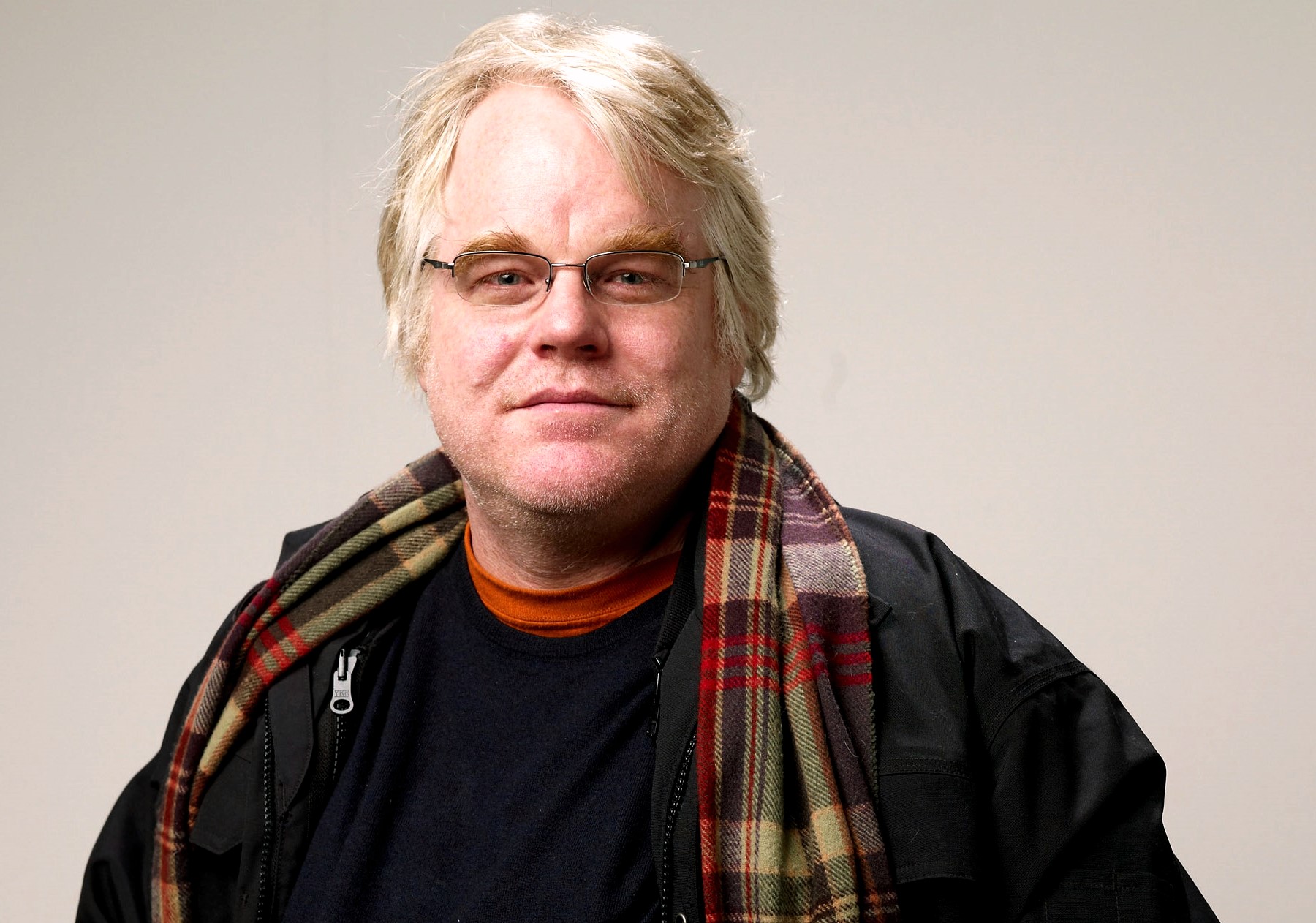
I don’t think any actor’s death has upset me more than Philip Seymour Hoffman’s. It bothers me on so many levels that he died at age 46. He should have had every resource imaginable to rebound to permanent sobriety, but experts called it a relapse bender into his heroin addiction. After Roger Ebert’s death, I felt a sudden cognition, however irrational, that there’s a lack of interesting people in this world (that I follow closely). And then Hoffman had to die and leave me feeling empty as well.
On a nerd level, he wasn’t Oscar nominated for several movies that were among his best work. This first one that comes to mind was “Before the Devil Knows You’re Dead” (2007), which to me was one of the five best performances of the decade. A couple of hours after I learned of his death on Sunday, February 2, I replayed that film in my head. Then I had recall – his character was a hardcore, big spending heroin addict. There’s a scene where he has paid for a room at a peddler’s condo, and I couldn’t help thinking the first time I saw it, Hoffman seems to understand this scene better than any other actor would. He knows the process, the procedure, the sensation, the decadent pleasure, the numbing of shooting up. Now I think that scene is sadder than ever.
I liked him movie after movie; I considered him a character actor. I think it was only halfway through the 2000’s that it dawned on me that he was one of the great actors, period. Long before that, the initial impressions he made on me were “Boogie Nights” (1997) and “Happiness” (1998), the former a 70’s porn saga and the latter a dark portrait of people incapable of being happy, and 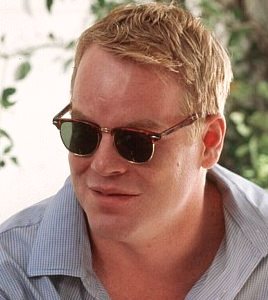 I surmised – this actor is a straight-jacketed dweeb that’s going to have a fruitful career playing losers. And be a typecast for it. Call me a movie fanatic, but I remember how I actually bobbed off my seat with befuddlement when I saw him in “The Talented Mr. Ripley” (1999, pic right). There was no way this dweeb could play a guy this cocky, ostentatious and moneyed. And do it so well. His range and versatility had struck me in that moment.
I surmised – this actor is a straight-jacketed dweeb that’s going to have a fruitful career playing losers. And be a typecast for it. Call me a movie fanatic, but I remember how I actually bobbed off my seat with befuddlement when I saw him in “The Talented Mr. Ripley” (1999, pic right). There was no way this dweeb could play a guy this cocky, ostentatious and moneyed. And do it so well. His range and versatility had struck me in that moment.
Movie after movie he was mesmerizing. In commercial fare, he could raise the bar with the entertainment value and the substance, in what would have been way too standard with another actor. First example, “Mission: Impossible III” (2006), where he played a grandiloquent snob of a villain. Second example, “Along Came Polly” (2004), which is a guilty pleasure for me. Back up a second. Would I even use a big word like “grandiloquent” to compliment another actor? Then there were the esoteric art films. I mentioned “Happiness” already, but how about “Synecdoche, New York” (2008) which is admittedly hard to sit through (and hard to analyze) but is fascinating and even engaging because of his wired-in commitment and gosh damn this cliché – the humanity he brought to the part.
I wanted to conclude this article with listing his five best performances. Then I looked at his oeuvre and realized there are too many great ones to choose from, and difficult to narrow to five. (Here I paused.) I have looked it over and will choose an essential five. And I will list some additional ones in brief as an addendum.
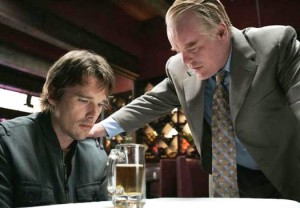 1. Before the Devil Knows You’re Dead (2007) – What a plum role for him since the film is an all-in-all modern tragedy. Desperate for money, Hoffman plots with his brother Ethan Hawke to rob his parents’ jewelry store because they know they have insurance. Hoffman is a persuasive, rapacious hound in the first place to convince his brother to team with him. An accident takes place during the caper unraveling into wrath between family members. What dramatizes is the downward spiral self-destruction and viperous backstabbing on his family. Yet Hoffman’s schemer has betrayed himself, and he knows it, and the sadness is powerful.
1. Before the Devil Knows You’re Dead (2007) – What a plum role for him since the film is an all-in-all modern tragedy. Desperate for money, Hoffman plots with his brother Ethan Hawke to rob his parents’ jewelry store because they know they have insurance. Hoffman is a persuasive, rapacious hound in the first place to convince his brother to team with him. An accident takes place during the caper unraveling into wrath between family members. What dramatizes is the downward spiral self-destruction and viperous backstabbing on his family. Yet Hoffman’s schemer has betrayed himself, and he knows it, and the sadness is powerful.
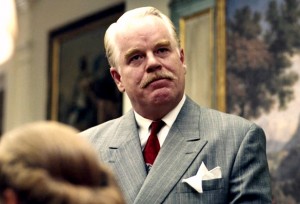 2. The Master (2012) – As Lancaster Dodd, Hoffman is a powerful and bombast figure with a start-up religion in the post-war 1950’s. Carefully modulated speech, rotund command of the room, he has what it takes to sway disciples to join. He lets everybody know that “We sometimes forget laughter is important,” but the more dubious aspects of his rhetoric is hogwash and yet frighteningly influential. I declared Matthew McConaughey the best supporting actor of the year in “Magic Mike,” but let’s face it, I’ve seen “Magic Mike” only once. A mistake, since I’ve watched “The Master” a countless number of times since then. I’ve been mesmerized by the film endlessly, and mesmerized by Hoffman, too. He was nominated for this.
2. The Master (2012) – As Lancaster Dodd, Hoffman is a powerful and bombast figure with a start-up religion in the post-war 1950’s. Carefully modulated speech, rotund command of the room, he has what it takes to sway disciples to join. He lets everybody know that “We sometimes forget laughter is important,” but the more dubious aspects of his rhetoric is hogwash and yet frighteningly influential. I declared Matthew McConaughey the best supporting actor of the year in “Magic Mike,” but let’s face it, I’ve seen “Magic Mike” only once. A mistake, since I’ve watched “The Master” a countless number of times since then. I’ve been mesmerized by the film endlessly, and mesmerized by Hoffman, too. He was nominated for this.
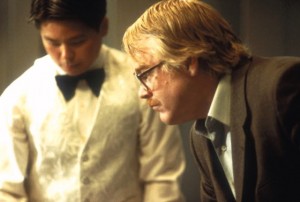 3. Owning Mahowny (2003) – The true story of a Canadian assistant bank manager who gambled millions of other peoples’ money at an Atlantic City casino. It’s said that his character only wins so he has more money to lose. He is a fussbudget when it comes to the ordinary purchases in life, he has a girlfriend he ignores, and is tunnel-visioned to gamble. With his performance, he avoids eye contact with most people, which I think he does to hide the shame. He mildly perks up when is on a winning streak, implosive when he loses. Another role where he was not nominated.
3. Owning Mahowny (2003) – The true story of a Canadian assistant bank manager who gambled millions of other peoples’ money at an Atlantic City casino. It’s said that his character only wins so he has more money to lose. He is a fussbudget when it comes to the ordinary purchases in life, he has a girlfriend he ignores, and is tunnel-visioned to gamble. With his performance, he avoids eye contact with most people, which I think he does to hide the shame. He mildly perks up when is on a winning streak, implosive when he loses. Another role where he was not nominated.
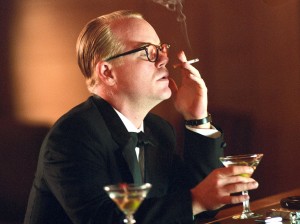 4. Capote (2005) – This was Hoffman’s Oscar win for Best Actor. As good as the film was, I didn’t think it was as fascinating as the actual real-life case dramatized in the terrific 1967 film “In Cold Blood.” What has stuck with me through the years is Hoffman’s ability to take a fairy-voiced dweeb and yet convince me still that Truman Capote could command a room. Once again, he demonstrated intellect and power, he injected that kind of intrigue and interest. But the fact that he did that with a character who was initially annoying and fey, is really quite remarkable.
4. Capote (2005) – This was Hoffman’s Oscar win for Best Actor. As good as the film was, I didn’t think it was as fascinating as the actual real-life case dramatized in the terrific 1967 film “In Cold Blood.” What has stuck with me through the years is Hoffman’s ability to take a fairy-voiced dweeb and yet convince me still that Truman Capote could command a room. Once again, he demonstrated intellect and power, he injected that kind of intrigue and interest. But the fact that he did that with a character who was initially annoying and fey, is really quite remarkable.
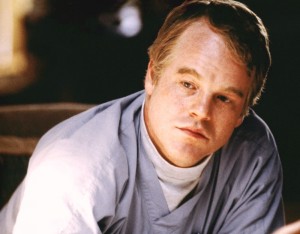 5. Magnolia (1999) – His greatness was overlooked (even by me) in its first release. That had something to do with a large ensemble cast – part of interlocking stories that crossed misguided souls – all of them doing some of the best work of their careers. The best one was obvious, Tom Cruise as a misogynistic guru who turns out to have a wounded past. But then you watched it again, and Hoffman’s caregiver was gracious, determined, painstakingly sympathetic, and charitable. Exactly the kind of virtues that get overlooked by Academy voters (and first-time viewers). Thus, he was not nominated.
5. Magnolia (1999) – His greatness was overlooked (even by me) in its first release. That had something to do with a large ensemble cast – part of interlocking stories that crossed misguided souls – all of them doing some of the best work of their careers. The best one was obvious, Tom Cruise as a misogynistic guru who turns out to have a wounded past. But then you watched it again, and Hoffman’s caregiver was gracious, determined, painstakingly sympathetic, and charitable. Exactly the kind of virtues that get overlooked by Academy voters (and first-time viewers). Thus, he was not nominated.
Another five great performances were “Boogie Nights” (1997) as the boom-mike operator loser with an unparalleled affection for the paramount stud Dirk Diggler; “Happiness” (1998) as an introvert pervert who makes obscene phone calls, and yet had depth and inner goodness he desperately tries to connect with; “Almost Famous” (2000) as the legendary rock journalist with an untouchable clout; “25th Hour” (2002) as a friend to Edward Norton’s feckless criminal who gets drunk while he tries to bring solace to him on his last night before going to prison; “Charlie Wilson’s War” (2007) as a hard-drinking blowhard CIA man who assisted a congressman in his campaign to free Afghanistan. I also don’t want to slight his first major movie role as an upper crust college preppie who gets a schoolmate in trouble in “Scent of a Woman” (1992), another one to check out.
This was difficult to write. I want to emphasize that. It took me two days to get to it, because I was still processing. He will be missed, and I can’t help but say, he was irreplaceable.




